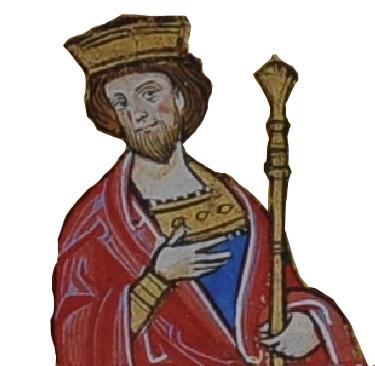Did the eloquent Přemysl Otakar I. trump even the Holy Father in the discussion?<
Sinners will not go unpunished, and Czech crowned heads are no exception. They can face the curse of the Empire - eight. They lose legal protection, no one is allowed to help them and they have to appear in court.
If they do not obey within a year and a day, the Roman king or emperor pronounces an aberacht on them, a final curse valid throughout the empire, when their property is forfeited to the state and the subjects are not obliged to obey them. A church curse, an interdict, prohibits church sacraments for a change.
Both curses fell on some Czech criminals at the same time...
He wants a bond annulment
"The marriage must be declared invalid," requests the Czech king Přemysl Otakar I. (1155/1167-1230) to the Prague bishop Daniel II in 1199. (†1214). He will thus take care of the first divorce in the Přemysl dynasty.
He and his wife Adléta Míšeňská (1160–1211) are said to be living in a forbidden union, because they are related in the fourth generation. He abandons his wife. But he cannot guess what kind of affair he will unleash when he exchanges his aging wife for Constance of Hungary (1180–1240), the sister of two Hungarian kings, Emmerich (1196–1204) and Ondřej II. (1205–1235).
He carols his hatred

Similar to other cases where he benefited from the marital difficulties of crowned heads, he also let the Czech king know that the result would be proportional to the king's willingness to adapt to curial interests," writes contemporary Czech historian Josef Žemlička. In the same year, in a letter addressed to the French priesthood, the Pope mentions the "Duke of Bohemia," who, like his contemporary, the French King Philip II. Augustus (1165–1223) rejected his legitimate wife and accepted an adulteress into his home.
But he won't let it go...
They turn concessions into benefits
He is conducting a trial against Přemyslovec. Adléta was therefore briefly accepted by her husband in 1204–1205. But when a son Václav was born to Constance in 1205, Přemysl rejected Adléta again. This time for good.
The Holy Father Innocent III, who in 1206 put the Czech king under a church curse because of his "inappropriate" marriage with Constance, behaved much more forcefully. The dispute drags on for another five years. It was only Adléta's death in 1211 that put an end to it.
Přemysl Otakar I then shows that he is a capable opponent of the Pope in discussions. "In the final balance, he was able to turn concessions into advantages and benefit even from difficult situations," Žemlička describes Přemysl's art of communication.
The head of the church finally recognizes the king's children from both marriages as legitimate - thus confirming the validity of the union with Constance...


 Tags:
Tags: Prev
Prev







